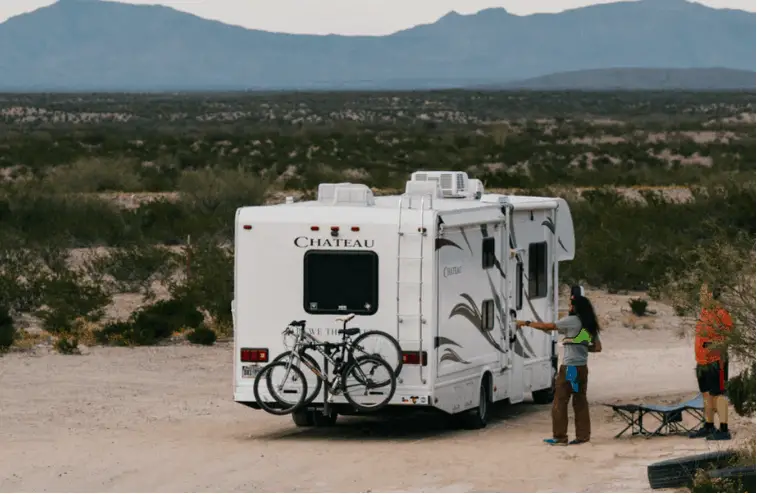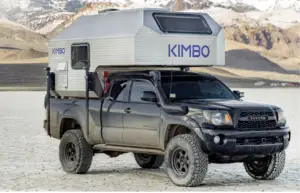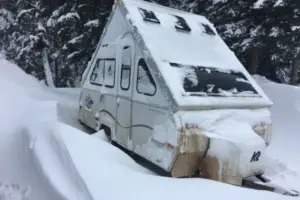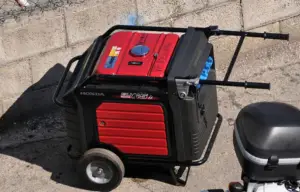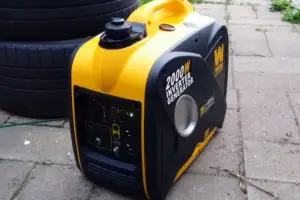Planning to buy air conditioner for your RV?
Well, I have made this guide, which hopefully will make the buying RV AC process for you a little bit simpler.
Remember buying low quality or cheap or even used ones can backfire in case of RV Air Conditioners.
Therefore choose the RV air conditioner after proper research and thought.
It increases your chances of ending up with something that is going to perform the job to the highest possible standard. This means keeping you nice and cool during the summer months.
What exactly to look in a RV Air Conditioner
There are multiple important things you need to look in an AC for your camper or travel trailer.
Whether you are buying it for the first time or trying to replace the existing rv air conditioner, just look consider this things. These include below.
BTU : British Thermal Unit is used to measure power or capacity of the AC to cool.
Price : Obvious one, you compare for quality and cost of the camper air conditioner.
Warranty : Higher the warranty better it is. Popular brands give upto 2 years of warranty
Weight : Its important for RV. You always want lesser weight appliances for your RV
Brand : It does matter. An industry popular brand is always better option as chances of it failing your expectations will be less.
Energy efficiency : It should be efficient enough.
Other additional features : Ducted or non ducted, Less noisy, shape (better aerodynamics), Easy to install.
Its just not AC features that you look. You need to look at your RV and get a matching AC with suitable capacity.
How to Determine the BTU of an AC for RV
So, what size air conditioner your should buy for your camper or RV? It can be confusing if you don’t have much knowledge on AC.
BTU is the unit that is used to measure an AC’s capacity to cool your area. So basically you need to decide on the BTU of the AC.
And you should be careful in choosing this. More BTU means more cost and better cooling as well. So, you don’t want to go for smaller AC and also not beyond your need.
Choosing Right BTU
You should always opt for a minimum of 13,500 BTU for your RV. This is the ‘cooling power’ of the AC unit.
Anything less than this, and it is probably not going to cool your space properly. Generally speaking, at this level, 13,500 BTU is going to be able to cool down around 550-feet of square space.
This may seem like a lot, but it really isn’t.
Do bear in mind that RVs do not function in the same way as homes, so they can heat up a little bit quicker so you need something with power to eliminate the heat.
Variation With RV Length
Each 100-square-feet that you remove from the equation will result in a decrease of 2,000 BTU.
So, a 400-square-foot area would require a 10,000 BTU air conditioner.
However, as I said, you are not going to want to go down below 13,500 BTU, even if you have a smaller vehicle (although, some may go down to 12,000 BTU).
If you are traveling in a warmer region, then even 15,000 BTU is going to be good.
Other Factors that influence the RV Air conditioner Size
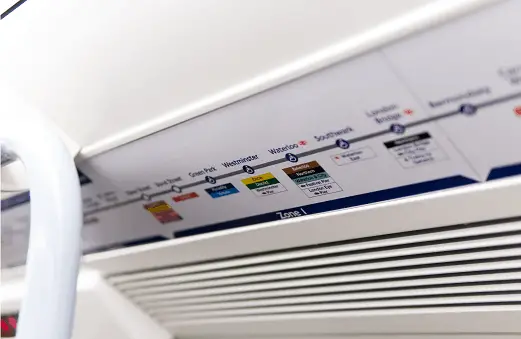
There are a couple of factors at play when it comes to determining what BTU you need for your vehicle.
As I said; the length of your vehicle is going to play a major role here, but it is not going to be the only factor.
Your RVing habbits : How often you open/close the door/windows
You will need to remember that if you regularly open and shut windows and doors on your RV, then the air conditioner is going to need to work a bit harder to cool the air down.
This is because you will constantly be introducing new hot air into the mix, and this needs to be removed from the environment somehow. This means that you will need to invest in an AC which is able to cope with that sort of thing i.e. it needs to have a lot of power behind it.
Weather : Humid or warmer region
If you are in a warmer or more humid climate, and you love to travel during the height of the summer season, then you will probably want to spend your cash on something a bit more powerful than normal.
I have seen some small RVs struggle to cool down in the most humid of climates as the power just isn’t there to remove the warm air from the environment.
Basically, if you buy the wrong AC, then it isn’t going to cool you down at all. It is just going to be a rather uncomfortable experience when you are sitting in your RV at night.
Read : How to Keep RV cooler without Air conditioner
Obviously, this can be impacted by shaking up where you park your RV, but you don’t always want to be looking for a shady location, do you?
Color of the RV
You may also want to think about the color of your RV. If the color is darker on the outside, then it heats up more on the inside.
This is why the vast majority of RVs you can buy are lighter colored e.g. white!
How much will you be spending on an RV Air Conditioner?
Prices for your typical RV air conditioner will be a bit cheaper than their house counterparts. Obviously, a lot of it is going to be based on the brand that you are purchasing, but expect to pay somewhere between $200 and $1,500.
The BTU will have an impact on it. Don’t forget; you will also need to consider ongoing costs. This means air filters and the like.
Buying an used RV air conditioner is also an option but honestly i wouldn’t go for it. Unless you know the person very well and the reason why its being sold.
So,where to buy the RV Air conditioner? One can buy on amazon or camping world and also on other online stores.
You can get discounts during festive seasons. Buying during off season can also be a good idea. Buy in winter or spring rather than summer when the demand is high.
RV Air conditioner weight
Weight is definitely an important factor when buying an appliance for your RV. You always try and get most compact and less weighing appliance.
As far as rooftop AC for RV is concerned most of them on an average weigh around 85 to 110 lbs.
Popular brands like Dometic, Coleman manufacture AC’s that weighs mostly 90-95 lbs. You should be fine with weight as getting lower weight may not be possible with higher BTU’s.
Do you need a second AC in your RV?
Most of you will not need second air conditioner in your RV. Having a second AC in your RV is going to suck up a lot of power.
Sure, if you have one of the largest RVs around, then you may have a need to get a second air conditioner, but most RVs won’t need one.
Upgrade to Better one Instead
If you do not feel that there is a sufficient amount of power in the AC that you are currently using in your RV, then upgrade it.
You are probably going to save a lot more money in the long run by upgrading to a more powerful AC than getting two low-powered ones.
Remember; if you have two ACs, that is double the maintenance. It is also double the number of things that can go wrong.
When You may Need Second AC in RV
It is recommended that you have a second air conditioner if your RV is over 32-feet-long.
At this point, the air flow may not be enough at one end of the RV to be adequately cooled down.
Do you need a generator to run your AC?

You probably shouldn’t be running an AC without a generator.
These things consume a lot of power.
This means that most alternative power sources (more on that soon) will not have enough power behind them to keep the AC ticking over nicely.
You may notice power outages, or you may even notice that certain equipment just breaks (or the AC isn’t work as effectively as possible)
Remember; when you are shopping for a generator for your AC, you will want to ensure that not only is there enough watts in it to keep the AC running, but also to ensure that everything else in your vehicle continues to work nicely.
Which brands offer the best RV Air Conditioners?
There are a lot of RV air conditioners on the market. You won’t go far wrong with an offering from one of these companies:
- Dometic
- Coleman
- Atwood
- Airxcel
- Advent
- ASA Electronics
Can you run it on another power source?
A lot of people wonder whether they can run their AC on a battery.
To be honest with you, this is not something that I would do. As you are about to find out; Air Conditioner units are power hogs.
You would need a pretty serious battery to keep even the smallest of ACs running long term. So, while it may run on a battery for a short period of time (a rather large battery at that), it is not something that you should really be doing.
Solar
You may be able to get by with a system running on solar power, but do bear in mind that solar power will have limitations.
It may not be able to cope with everything else in your RV once you throw the AC into the mix. This is because the AC is going to be a ridiculous power hog.
You should always stick to the generator.
Yes.
It is a bit tougher to lug around, but as long as you make sure that the generator is always topped up with fuel, then you aren’t really going to run into any issues where your RV air conditioner simply stops working.
It is going to keep ticking along, keeping you nice and cool.
How many watts does an AC in an RV need?
It is going to be completely dependent on the amount of BTUs that your air conditioner offers.
The higher the BTU number, the more power it is going to consume.
However, no matter what air conditioner you buy, it is likely that the rooftop air conditioner is going to be sucking more power than anything else in your RV.
Even the smallest air conditioners need at least 1000W when you are booting them up. They will consume a further 600W+ when they are running.
Larger ones can change this number to 2000W and 1200W respectively. So, really, you are going to need to have a lot of power behind them.
Average watts consumption by different appliances below:
| RV Appliance | Average Watts For running |
| Air Conditioner | 1200 Watts at 12500 BTU |
| Refrigerator | 180 Watts |
| Coffee Maker | 500 watts |
| Microwave | 950 watts |
| Cooker | 150 |
| TV | 150 Watts |
| Hair Dryer | 1800 watts |
| Electric Grill | 1600 Watts |
Read More : How many watts do RV air conditioners consume
So, don’t try and go for small RV air conditioner. Try to get a one with sufficient BTU so that you don’t have to upgrade it or even think of getting the second one.
Can you heat RV with air conditioner?
This is not possible unless you also buy heat strips for the air conditioner and this not possible with all air conditioners. Its always better to go for separate heater rather than going for combined cool and heat.
Difference between ducted and non ducted RV air conditioners
I did mention about this as the deciding factor initially but didnt elaborate on this much. Lets see whats the difference the two and how it matters.
Ducted Air conditioner :
This is more system approach where in roof air conditioner connect with the ducts inside of your RV.
The cooler air is then distributed using these inside ducts rather then ac directly doing it. The air distribution can be controlled using remote control or wall mounted thermostat.
Non Ducted Air conditioner :
In this case the air conditioner directly pushes the air into the RV interior ad there is no connecting with ducts like in ducted. This is more simpler where in air is directly blowing inside.
Can you use a portable AC in an RV?
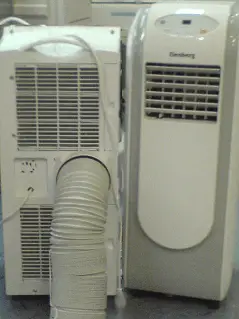
You probably could.
However, most people who own a portable AC find that it doesn’t really have that much of an impact on the RV.
It won’t cool you down at all.
The air that it is sending through the system will also be a lot less fresh.
It may be fine to get a portable AC if you are in a place which doesn’t get too warm.
But, to be honest, with the price that most of the portable ACs on the market come in at, it would probably be far, far better if you just opted for a normal rv roof air conditioner.
You will be saving money in the long run, and it is going to be a whole lot cooler for you.
The only time that you will ever want to opt for a portable AC is if you are planning to use it inside of your home as well.
Read More : How to Install Portable AC in an RV
How do you install an AC in your RV?
I am not going to go through absolutely everything that you need to know about installing an AC in your RV.
Installing an AC on your RV roof can be easy if you know few basic things already.
This is because there are a lot of nuances between models. You should always read the manual that came with your AC to know exactly what you are doing.
However, generally speaking, most of what you need to do can be done with simple tools. It is a basic DIY task.
RVs will have the basic setup :
The vast majority of newer RVs on the market will already have a hole in the roof for the AC. It is simply a case of lining up the AC with this hole, bolting it into place, and then wiring your AC into the rest of the system.
Taking professional help :
Things do become a little bit more complicated if you do not already have a hole in the roof for the AC. In this case, it is probably going to be worth consulting with a professional as opposed to doing it yourself.
If you do it yourself, then there is a massive risk you could create a huge hole in the roof. This would result in an ineffective AC unit.
Maintaining an RV Air Conditioner
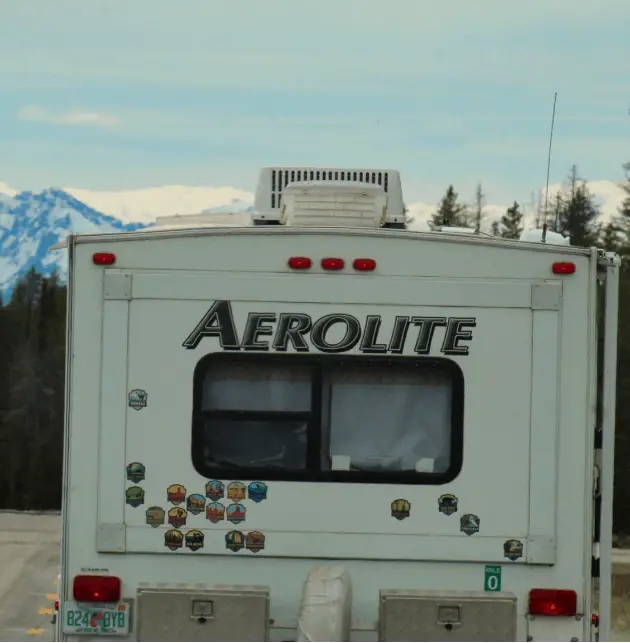
If you want to keep your AC running for as long as possible, then you are going to need to do a little bit of maintenance work on occasion.
You can face several issues like leaking AC or it may not cool the RV properly. In short, problems can be numerous but you can always keep things okay if you do regular maintenance.
To start with, you need to regularly change your filters.
This part is vital. If you do not change your filters regularly, then you will find that your AC needs to work harder. This means that it is going to be consuming a lot more energy.
Not only this, but it is going to be spraying dust particles around your RV. This is not going to be good for your allergies. There will be instructions on how to change your filter with your AC.
In addition to this, you are going to want to clean the insides of the AC out regularly too.
Use a vacuum cleaner for this. You probably will not be able to get everything out of the AC, but try and get as much dust as you possibly can. You should be doing this at least once per week if you are using the AC regularly.
Finally; don’t forget to clean the area around the AC.
If dust congregates here, then you are pretty much asking for trouble. It is going to get sucked up into the AC, which makes your cleaning job later on a whole lot more difficult.
While using an Air conditioner you will face number problems as the years go on.Here are some most common problems with AC in RV and how to fix them.
Efforts needed for Troubleshooting the RV air conditioner obviously depend on how big the problem is. Go ahead with the repair only if you fully understand the basics else you may end up doing more bad.
How long can you expect an AC in an RV to last?
Obviously, this is something that is going to be dependent on a lot of factors.
However, assuming you are not using it every single day, and you have purchased a quality air conditioner for your RV, I think that you should be able to get at least a few years of use out of it.
The more effort you put into maintaining your AC, the longer it is going to end up lasting too.
Generally speaking, the only way an AC is going to last a very short period of time is if you are not maintaining it, or if you didn’t bother to spend that much cash on it in the first place.

